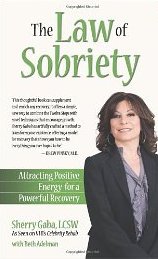There have been many bestsellers written about healing through the power of positive thinking—You Can Heal Yourself, The Secret, The Law of Attraction—all suggesting that what you put out into the universe is what you receive in return.
This simple theory took the world by storm when it was first introduced and continues to connect with millions. Now, psychotherapist and licensed clinical social worker Sherry Gaba, the Life Coach on VH1’s Celebrity Rehab and recovery blogger for Beliefnet, offers a method for putting this theory into action for addiction recovery.
The Law of Sobriety: Attracting Positive Energy for Powerful Recovery (HCI $14.95) combines the power of positive thinking with real action steps; you will transform your life by shifting your focus from addiction to behaviors that align with sobriety.
Sherry Gaba, who writes the Moving Beyond Addiction blog on Beliefnet, discusses her new book, her favorite recovery stories and her work on Celebrity Rehab.
What is the Law of Sobriety about and how does it differ from other treatment options for addicts and alcoholics?
The Law of Sobriety is simply seven steps that an addict or alcoholic can go through to help them achieve sobriety. The seven steps need not be in any order. They include finding one’s life purpose, living a life of value, living a life of authenticity, learning to live in appreciation, compassion, and forgiveness, living a life of right action, living with awareness and mindfulness, and learning to let go of resistance and attachments.
How did you get into this field?
I went back to school later in life and my goal originally was to help single parents and their families. I had been a single parent and wanted to give back what had been given to me by mental health professionals. After a series of jobs from doing custody mediation to hospice, I landed a job at the famed treatment center in Malibu Promises. I also married someone who is a recovering addict and alcoholic and realized I had my own issues with substance abuse at various times in my life. All of these issues lead me to working in the field of substance abuse.
You worked on Celebrity Rehab 2 and most recently Celebrity Rehab 3 on VH1 with Dr. Drew Pinsky, the famous media addiction specialist, what was that experience like?
Very real. Although, it consisted of a population of celebrities, it was real treatment in a real rehab. It shows for the average person contemplating treatment, what goes on in a rehab and hopefully, encourages them to look into treatment if they are considering that as an option in their own life.
Are celebrities different than other addicts and alcoholics?
Yes and no. Most people go into treatment with a history of pathology whether it is trauma, abuse, abandonment issues, loss, or the genetic predisposition. However, celebrities are sometimes treated differently in treatment, which I do not believe is a good idea. When you give them special privileges, I believe you are playing into their disease. Their disease is no different than anyone else and they should be treated no differently. I had a celebrity client who kept cancelling her appointments. When I asked her to pay me for her cancelled appt. because she didn’t give me 24 hrs. notice which is my policy; she stopped coming to see me. She was only hurting herself by not coming back, not me.
What type of addictions do you see today that are the most prevalent?
I am seeing a lot on teenagers and young adults getting hooked on pain killers such as Oxycontin and Vicodin, and a large amount of heroin addicts. It is quite alarming. The biggest reason they say they use or relapse is because of “boredom.” That is why my book emphasizes the importance of having a purpose and meaning in your life to help avoid the pitfalls of restlessness.
What is addiction?
The most common definition is it is a biological disorder with a genetic predisposition. It is progressive in nature and it effects every area of your life including career, school, finances, legal, relationships, and health and well-being. It is also the only disease that tells you, you don’t have a disease. We call that “denial.”
What is your opinion about AA versus the Law of Sobriety or other types of treatment programs for addiction?
I do not believe recovery is a “one size fits all.” I have seen many programs work. I do believe treatment is a personal choice. However, I do believe a person needs a spiritual program or some type of belief system to help them through the process of recovery. What that means to each individual varies. Call it a Higher Power, the Universe, Allah, Buddha, a Life Force, a Universal Energy, higher self; that does not matter, as long as they realize they have the support of something other than the chatter in their mind to help them heal. They need to have something to help them transcend their own need to control everything and everyone around them.
How do you help a loved one who is addicted?
Unfortunately, if they are not ready to get sober, there is not much you can do. You can try to create consequences for their behavior such as leaving them if they don’t get sober if it is a partner or spouse. If it is a young adult, you can tell them they must leave your home or you will stop supporting them financially, unless they get help. You must stop enabling the disease; however, you must support their recovery. What that means for each individual is different.
What type of help is out there for the family of the addict?
There is Ala-non or Co-Dependents Anonymous 12 step programs that help support you staying on your side of the street through the recovery process. You can get therapy. It is all about taking care of yourself and not allowing the addict or alcoholic to be your primary focus.
Besides the genetic predisposition of alcoholism or addiction, what are some other emotional components to the disease?
I believe a history of trauma, abuse, abandonment, as I said earlier; play a central role in the disease. Often addicts were deprived of proper attachment to their primary caregiver during their infancy stage. This emotional loss causes them the inability to be able to regulate emotions. They never learn how to cope with life’s ups and down. Their emotional pain is masked by drugs and alcohol.
Does shame play a part in their disease process?
Yes. Often addicts and alcoholics don’t feel they are worthy of being loved or accepted for who they are because they never received that as an infant or child. Addicts are sick people, not bad people.
What do you mean by finding your life purpose?
Everyone has a purpose. Self-esteem is created by following through with something that is purposeful and gives you meaning. It can be as little as organizing your closet to going back to school. It is about finding a passion and following through with it.
Why did you write this book?
My work in this field has brought me an understanding that people really do want help, but there is no cookie cutter approach. Many of the clients who walk through my door are just looking for answers to help alleviate their emotional pain. Although I am a huge fan of the 12 steps, sometimes it takes another program such as the Law of Sobriety to get them to enter the doorway that may eventually lead them to a 12 step program.
What is your greatest success story?
I have many. However, the person who inspires me the most is my husband. He had ten years of recovery, went out one night with one beer which lead him to becoming homeless five years later. With now eight years clean and sober, he has rebuilt his life starting at age 45 and he is now 53. He went back to school at age 50 to become a Chemical Dependency Counselor. If he can do it, anyone can, young or old. It is never too late to get clean and sober.
What would you like people to go away with after they read your book?
There is always help out there. There is not one road to getting clean and sober. I hope to bring hope, serenity, joy, and meaning to all those who read my book.



